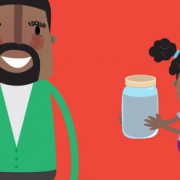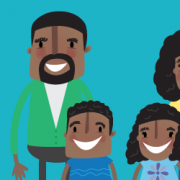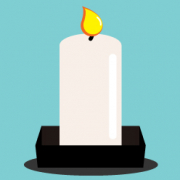This activity compares fire safety rules with “sin safety rules.” It can be used alone, or in conjunction with three other hands-on options: “firefighting,” “five-bell alarm” and “detecting temptation.” As you engage your children in this activity, ensure that they understand that playing with fire is very dangerous and that they are never to try any of these activities without parental permission and supervision.
Plan to go camping, or stay outdoors until late evening, and have a campfire or a bonfire. Alternatively, simply use a candle and extinguish the flame with a small cup of water or a spray bottle. Review some basic fire safety rules as you travel to the location where you will build a fire, or as you set up your candle. As you discuss these rules, invite your children to think of similar rules for dealing with sin – the “sin safety rules.” Explain that sin, like fire, is dangerous. Just as rules help us stay safe around fire, other rules can keep us safe when we are around sin and temptation. (Sample ideas for “sin safety rules” are provided in the chart that follows.)
As you start your campfire, have your children consider what a fire needs in order to burn. First, explain that all fires need oxygen (from the air) and fuel. Then have your kids identify potential sources of fuel. Typically, wood is used to fuel a fire, but candles use a wick and wax as fuel. Over the course of your fireside time, show your children how the fire goes out if the air or fuel is removed. (For example, watch how the fire dies down if it isn’t fed, or snuff out your candle, then eventually dump water on the fire or spray your candle with water to put it out.) Use these questions to discuss the danger of sin and fire:
Questions for discussion
- How do you stop a fire from burning?
- If your clothes catch on fire, how could you put the fire out?
- How is sin like fire?
- How does temptation turn into sin?
- Can you fight small temptations using your own strength?
- How could Satan trick you into thinking you are strong enough to fight all temptation on your own?
- If you feel tempted to sin, what is the best way to snuff out the temptation?
- What needs to be present in order for a person to sin?
- When you have anger that is burning like a fire, how can you stop it from causing you to sin?
Key concepts
Sin is a lot like fire, because the more we “play” with it, the more we can get hurt. Explain to your children that you can blow on a candle and remove enough heat to end the fire. You can also put a small cup upside down over a candle to make it go out quite easily. A candle is like “a little bit of temptation;” Satan can fool us into thinking that we are stronger than sin or fire and able to deal with it in our own strength. However, if we were to try to blow or snuff out a large fire, we would soon realize that the fire is much stronger than we are.
Just as fire safety rules help us stay safe around fire, God gives us the Holy Spirit and the Bible to help us avoid the dangers of sin. God is way more powerful than Satan and when we pray and ask for help, God is always there to “provide a way out” and rescue us.
Relevant Scripture
Romans 6:16, 23 “Don’t you know that when you offer yourselves to someone to obey him as slaves, you are slaves to the one whom you obey – whether you are slaves to sin, which leads to death, or to obedience, which leads to righteousness? . . . For the wages of sin is death, but the gift of God is eternal life in Christ Jesus our Lord.”
1 Corinthians 10:13 “No temptation has seized you except what is common to man. And God is faithful; He will not let you be tempted beyond what you can bear. But when you are tempted, He will also provide a way out so that you can stand up under it.”
2 Peter 1:3-4 “His divine power has given us everything we need for life and godliness through our knowledge of Him who called us by His own glory and goodness. Through these He has given us His very great and precious promises, so that through them you may participate in the divine nature, and escape the corruption in the world caused by evil desires.”
James 1:13-15 “When tempted, no one should say, ‘God is tempting me.’ For God cannot be tempted by evil, nor does He tempt anyone; but each one is tempted when, by his own evil desire, he is dragged away and enticed. Then, after desire has conceived, it gives birth to sin; and sin, when it is full-grown, gives birth to death.”
|
Fire safety rules
|
Sin safety rules
|
| Don’t play with matches and lighters. If you see matches or a lighter where you can reach it, don’t touch it. Go tell a grown-up right away. |
If something is tempting you to sin, ask an adult to help. For example, if you see cookies left out on the kitchen counter after snack time is over, ask an adult to put the cookies away so you are not tempted to take one and disobey your parent’s rule: “Ask before you eat a sweet treat.” |
| Ask your parents to install smoke detectors on every floor and in the sleeping areas of your home. Smoke detectors can save lives. Ask your parents to show you where each one is located. |
Remind your parents to pray with every day, asking the Holy Spirit to help you recognize or “detect” temptation. |
| Remind your parents to test your smoke detectors every month. Everyone in your family should be familiar with its piercing sound. This sound means danger, and that you must escape quickly. |
When your conscience makes you aware that there is temptation close by, pray as soon as possible to escape the danger of being lured into sin. |
| When your parents change the time on your clocks for Daylight Saving Time, ask them to change your smoke alarm batteries. With fresh batteries, your smoke alarm will stay awake and watch for fire while you are sleeping. |
Listen to your conscience. Don’t let your conscience become “dead” like a smoke detector with a worn-out battery or no battery at all, because you have told it to be quiet too often. |
| In case of fire, don’t hide! Go outside! Fires are scary, but you should never hide in closets or under beds when there is a fire. |
Just because you are tempted to sin, doesn’t mean that you are bad! Don’t hide; go find Mom or Dad or ask Jesus for help! |
| To escape during a fire, fall and crawl. It’s easier to breathe in a fire if you stay low while getting out. Use the back of your hand to test if a door is hot before you open it. If it is hot, try another way out. |
To escape from the power of sin, get on your knees! Be humble and pray, asking God for help! |
| If your clothes are on fire, stop, drop and roll until the fire is out. Shout for help, but don’t run. Running makes fire burn faster. |
If you know you have sinned, God will forgive you and help you out of it! Stop sinning, drop to your knees in prayer. |
| Have an escape plan and practice it with your family. Find two ways out of every room in case one way is blocked by fire or smoke. Practice escaping by both routes to be sure windows are not stuck and that screens can be removed quickly. |
Know your sin tendencies or weak areas and have an escape plan set up for when Satan tempts you to sin. A great “escape plan” is to have a Bible verse memorized that you can say when Satan comes prowling around. |
| Choose a meeting place outside so you will know that everyone has exited safely. Never go back into a burning building for any reason. If someone is missing, tell the firefighters. They have the equipment to safely rescue people. |
Just as you’d never try to put out a fire or enter a burning building to rescue someone on your own, never try to fight temptation and sin without God’s help. God is the one who has power over Satan and sin. He will rescue us from sin when we ask. |
| This is the local emergency number: ________. Put this phone number on your refrigerator and on every telephone in the house. If there is a fire at your house, choose one family member to call the fire department from a neighbour’s phone. |
Know that you have a direct line to Jesus any time you need to call. You don’t need to have memorized an emergency number to get in touch with God! |









